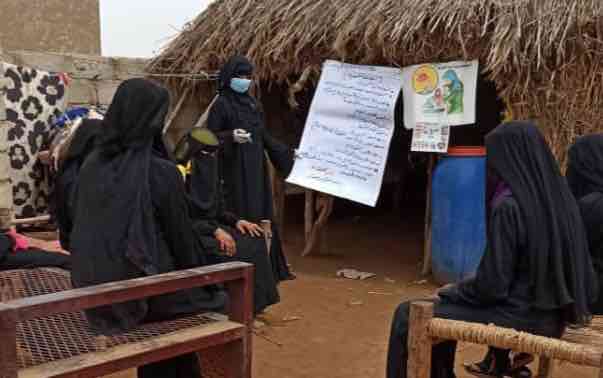In the world’s most dangerous conflict zones, a child dies from extreme hunger every minute (Save the Children). Can nutrition education in these places help make a difference? Given the challenges of conducting research amid humanitarian crises, this remains a mostly open question. However, in areas not beset by conflict, research has found that behavior change communication (BCC) programs improve knowledge and practices around infant and child nutrition, leading to improved health. Community based, culturally appropriate BCC approaches have been found to be especially successful.
In a paper published in Maternal Child and Nutrition, we explored this research and policy gap, finding a child nutrition BCC intervention in Yemen amid the humanitarian crisis from 2015-2017 significantly improved breastfeeding and water treatment practices.
The intervention was part of Yemen Cash for Nutrition, a Yemen Social Fund for Development pilot program aimed at reducing high rates of child malnutrition in the city of Al Hodeidah. Mothers were given monthly cash transfers on the condition that they attend monthly nutritional training sessions led by locally recruited female community health volunteers. Participants completed questionnaires regarding their knowledge and practices before and after participating, and the changes in their responses were compared to a control group of non-participants meeting the same program eligibility criteria in different communities within the same districts to determine the effectiveness of the training.
Attendance at nutrition training sessions was high despite the loose conditionality, with 96% of participating households attending at least one session. The results were positive. Women who participated in the program were 15.6 percentage points more likely to report breastfeeding within the first hour after delivery, and 14.4 percentage points more likely to feed their children only breastmilk while under the age of six months (both of which improve child nutrition). The program also led to a 16.7 percentage point increase in the probability of a household treating drinking water consumed by adults, and a 10.3 percentage point increase in the same probability of treating drinking water for children under two.
There was also evidence suggesting a spillover of knowledge from participants to non-participants within the same communities, shown in a positive trend in the probability of better breastfeeding and water treatment practices. This is especially notable given the declining economic conditions due to the conflict during the study period. This was likely because of the surprisingly high attendance rate of non-participants (who had no cash incentive to attend) and the presumed role of informal social networks spreading information from the nutrition training, as shown by other, similar research. Since this non-participant spillover was observed, it’s possible that the true positive impact of the program could be even greater than what was captured by our comparison of participants with non-participants.
This positive spillover, plus the lack of enforcement on the attendance condition, speaks to the effectiveness of the community health volunteers at reaching women, including those temporarily displaced by the conflict who couldn’t attend all the sessions even if they wanted to.
Seventy three percent of mothers in the sample were illiterate, yet for the knowledge-based questions there was no significant difference between literate and illiterate women’s responses. However, for water treatment practices, the program’s positive impacts were significantly larger for literate women. This fits with existing research showing that mothers with higher education levels are better able to put the knowledge they have received into practice. Furthermore, unlike breastfeeding, water treatment practices involve direct costs that more educated women with more resources might find easier to cover.
While the results of the BCC intervention were positive overall, the civil conflict still affected both program and participants. A lack of funding suspended training sessions for a year, and participants reported a 22% increase in food insecurity and a 7% rise in the number of households hosting displaced relatives.
The difficult conditions posed special problems for mothers with infants. Looking at trends between the baseline data from 2015 and follow-up data from 2017, breastfeeding during this period was becoming more difficult, with women’s dietary diversity and ability to produce breast milk declining, and use of formula increasing. Thus, we can see that the 11%-14% increase in women feeding their children only breast milk in the first six months is a substantial success for Cash for Nutrition, even if it may appear modest compared to the results of BCC programs in peaceful areas.
This research is especially meaningful for guiding humanitarian programming within Yemen; there were high levels of child mortality even pre-conflict, but right now the nation is on the brink of famine, with effects compounded by outbreaks of cholera and more recently, COVID-19. Best practices for breastfeeding and water treatment are more critical than ever in Yemen, but the lessons from this study are also valuable for formulating policies and programs in other conflict areas. These findings are an important first step in understanding the effectiveness of culturally relevant BCC in humanitarian crises.
Sikandra Kurdi is a Research Fellow with IFPRI’s Development Strategy and Governance Division, based in our Egypt Office in Cairo; Sarah Edwards is an IFPRI Social Media Specialist.
Funding for this research was provided by United Nations Development Programme (UNDP), the World Bank Group, Gesellschaft für Internationale Zusammenarbeit (GIZ), the IFPRI-led CGIAR Research Program on Policies, Institutions, and Markets (PIM), and the Nordic Trust Fund.







